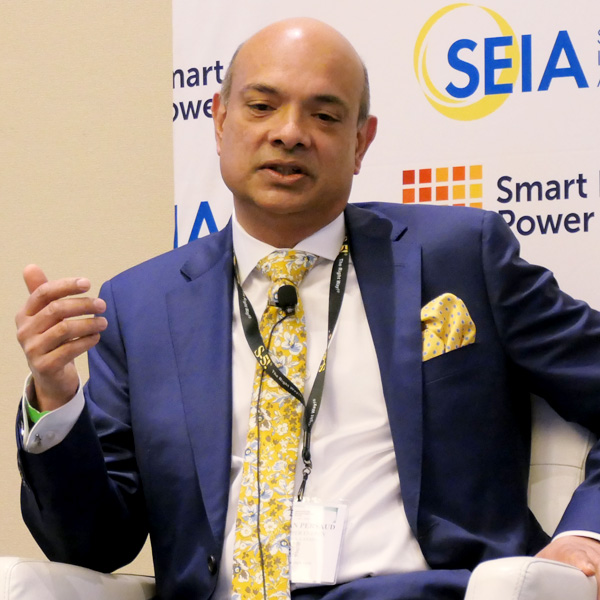As solar developers eye Massachusetts and its growing incentive program, new challenges are arising that could continue to put up barriers to development in the state.
In December, Massachusetts doubled its solar incentive program, the Solar Massachusetts Renewable Target, from 1,600 MW to 3,200 MW of capacity, a boon to the growth of the solar industry there.
But an unexpected level of resistance and confusion at the local level continues to hinder solar developers.
 Jonathan Persaud, Grasshopper Energy | © RTO Insider LLC
Jonathan Persaud, Grasshopper Energy | © RTO Insider LLC“I think we’ve certainly bruised our knees a tremendous amount on the coordination that needs to go on between the regulator, utility and even local townships themselves,” said Jonathan Persaud, chief commercial officer of the Canadian solar company Grasshopper Energy.
Ensuring that local townships understand the projects’ objectives has “proven to be a much, much more heavy lift than certainly we ever imagined coming into Massachusetts,” he said during RE+ Northeast on Thursday.
Speaking at the conference, Persaud and other industry and government representatives described a difficult landscape when it comes to dealing with local governments.
Municipalities, they said, are uneasy about the financial and safety prospects of having solar projects come to town and feel harried by developers.
The Tax Question
 Tim Roughan, National Grid | © RTO Insider LLC
Tim Roughan, National Grid | © RTO Insider LLC“Siting reform is critical,” said Tim Roughan, director of regulatory strategy for National Grid. At the base level, he added, the simplest way to incent cities and towns to want solar development is to “bribe them.”
He suggested that developers and policymakers should look for ways to incentivize solar projects to give more back to communities.
“You need a way so that folks will have certainty; the town will have certainty about how they’re going to pay their bills,” Roughan said.
Massachusetts law exempts many solar systems from property taxes, and some solar farms skirt taxes by using their output to heat or cool buildings and take advantage of an old state solar water heating incentive, Roughan added.
“That town doesn’t want any more solar,” he said. “Can you blame them?”
Paying more in taxes is not necessarily a dealbreaker for developers.
“I don’t think many solar companies would say that we’re unwilling to pay property taxes,” said Jessica Robertson, director of New England policy and business development for Borrego. “I think we’re absolutely willing to pay and contribute to the local economy.”
By removing the risk, she added, paying property taxes can be borne by the project economics.
Frustration and Education
 Elizabeth Mahony, assistant attorney general and senior energy policy adviser to Massachusetts Attorney General Maura Healey | © RTO Insider LLC
Elizabeth Mahony, assistant attorney general and senior energy policy adviser to Massachusetts Attorney General Maura Healey | © RTO Insider LLCCreating a good relationship with communities involves more than money, said Elizabeth Mahony, an assistant attorney general and senior energy policy adviser to Massachusetts Attorney General Maura Healey.
“There are big questions out there because it’s not just necessarily a cost issue; it’s a ‘they’re tired’ issue,” Mahony said “A lot of [developers] have hit up the same towns quite a number of times.”
The towns are frustrated and “worried about their future agricultural needs,” she said.
Also serving as a hindrance to further development is a continuing lack of information and education about solar.
In some instances, Persaud said, he has had to explain that solar modules don’t give off radiation and that lithium-ion batteries are not nuclear bombs.
“We need to provide incentives and also education,” he said, “And we need to provide assistance from an urban planning point of view.”



